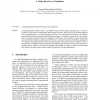Free Online Productivity Tools
i2Speak
i2Symbol
i2OCR
iTex2Img
iWeb2Print
iWeb2Shot
i2Type
iPdf2Split
iPdf2Merge
i2Bopomofo
i2Arabic
i2Style
i2Image
i2PDF
iLatex2Rtf
Sci2ools
ICAART
2011
INSTICC
2011
INSTICC
Feature Induction of Linear-chain Conditional Random Fields - A Study based on a Simulation
Related Content
| Added | 29 Aug 2011 |
| Updated | 29 Aug 2011 |
| Type | Journal |
| Year | 2011 |
| Where | ICAART |
| Authors | Dapeng Zhang 0002, Bernhard Nebel |
Comments (0)

